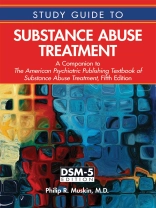Study Guide to Substance Abuse Treatment is a question-and-answer companion that allows you to evaluate your mastery of the subject matter as you progress through The American Psychiatric Publishing Textbook of Substance Abuse Treatment, Fifth Edition. The Study Guide is made up of questions divided into individual quizzes of 10-20 questions each that correspond to the chapters in the Textbook. Questions are followed by an Answer Guide that references relevant text (including the page number) in the Textbook to allow quick access to needed information. Each answer is accompanied by a discussion that addresses the correct response and also (when appropriate) explains why other responses are not correct.
Table of Content
Contributors Preface Part I: Questions Chapter 1. Neurobiology of Addiction Chapter 2. Genetics of Addiction Chapter 3. Epidemiology of Addiction Chapter 4. Cross-Cultural Aspects of Addiction Chapter 5. Science in the Treatment of Substance Abuse Chapter 6. Assessment of the Patient Chapter 7. Screening and Brief Intervention Chapter 8. Patient Placement Criteria Chapter 9. ‘Recovery’ in Chronic Care Disease Management: ‘Disease Control’ in Substance Use Disorders Chapter 10. Neurobiology of Alcohol Use Disorder Chapter 11. Treatment of Alcohol Intoxication and Alcohol Withdrawal Chapter 12. Neurobiology of Stimulants Chapter 13. Clinical Management: Cocaine Chapter 14. Clinical Management: Methamphetamine Chapter 15. Hallucinogens and Club Drugs Chapter 16. Tobacco Use Disorder Chapter 17. Benzodiazepines and Other Sedatives and Hypnotics Chapter 18. Treatment of Anabolic-Androgenic Steroid–Related Disorders Chapter 19. Neurobiology of Opiates and Opioids Chapter 20. Opioid Detoxification Chapter 21. Methadone and Buprenorphine Maintenance Chapter 22. Opioid Antagonists Chapter 23. Neurobiology of Marijuana Chapter 24. Treatment of Cannabis Use Disorder Chapter 25. Psychodynamic Psychotherapy Chapter 26. Cognitive-Behavioral Therapies Chapter 27. Motivational Enhancement Chapter 28. Twelve-Step Facilitation: An Adaptation for Psychiatric Practitioners and Patients Chapter 29. Contingency Management Chapter 30. Network Therapy Chapter 31. Group Therapy Chapter 32. Family Therapy Chapter 33. Inpatient Treatment Chapter 34. Therapeutic Communities Chapter 35. Community-Based Treatment Chapter 36. History of Alcoholics Anonymous and the Experiences of Patients Chapter 37. Psychological Mechanisms in Alcoholics Anonymous Chapter 38. Outcomes Research on Twelve-Step Programs Chapter 39. Women and Addiction Chapter 40. Perinatal Substance Use Disorders Chapter 41. Adolescent Substance Use Disorders: Epidemiology, Neurobiology, and Screening Chapter 42. Adolescent Substance Use Disorders: Transition to Substance Abuse, Prevention, and Treatment Chapter 43. Psychiatric Consultation in Pain and Addiction Chapter 44. Prevention of Prescription Drug Abuse Chapter 45. HIV/AIDS and Hepatitis CChapter 46. Substance Use Disorders Among Physicians Chapter 47. Substance Use Issues Among Lesbian, Gay, Bisexual, and Transgender People Chapter 48. Minorities Chapter 49. Testing to Identify Recent Drug Abuse Chapter 50. Medical Education on Addiction Chapter 51. Prevention of Substance Abuse Chapter 52. Forensic Addiction Psychiatry Chapter 53. Substance Abuse and Mental Illness
About the author
Philip R. Muskin, M.D., is Professor of Psychiatry at Columbia University Medical Center; Chief of Consultation-Liaison Psychiatry at New York–Presbyterian Hospital/Columbia Campus; and on the faculty of the Columbia University Center for Psychoanalytic Training and Research in New York, New York.












